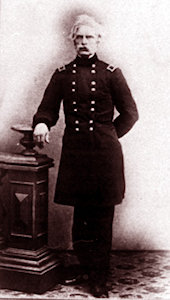1. I concur fully with Major Heintzelman and the officers of the posts of Fort Brown and Ringgold barracks; and the former distinctly stated to me that he had received reliable information that Cortinas had left the country, and that the war was over, and that he had so officially reported to department headquarters; and the latter one, I believe, with only one exception, of the opinion that the affair having been, from the commencement, greatly exaggerated, never approached the dignity of a war, but was, in its commencement and continuance, a mere raid, which, in all its parts, had been very greatly exaggerated, and was now finished unless renewed by aggressions on one part.
2. In travelling to and from, and while at Brownsville and Ringgold barracks, I heard, at different places, and from different individuals along the frontier, reports immediately from the Mexican side, which uniformly (with, I think, only one solitary exception) represented Cortinas to have retired into the interior of Mexico; some of them stating that he had taken his family and all his stock with him.
3. The citizens who had abandoned their plantations on the river, were many of them returning.
4. Persons, singly and without escort, and small parties travelled safely over the road. I met them frequently.
5. Cortinas’s mother, who has a plantation a few miles from Brownsville, (the buildings and fences of which were destroyed by the Texan rangers,) and his brother, who had returned to the Mexican side, had petitioned the authorities of Brownsville for authority to return.
6. All the numerous reports of Cortinas being at Matamoras, or in its vicinity, were subsequently found to be false.
7. Perfect quiet and apparent security prevailed at Brownsville, Ringgold barracks, Edyburg, Rio Grande City, and all along the river between those places.
8. Communications between the two countries was constant and undisturbed, and immense quantities of goods were constantly being crossed from Brownsville and Matamoras.
These, with the incidental considerations, convince me of the correctness of that despatch, any subsequent contradicting report to the contrary notwithstanding; and I feel the most perfect assurance that, by the removal of the Texan volunteers (a great and reciprocal animosity subsisting between them and the Mexicans) from the frontier, by a judicious distribution of regular troops along the line, the present force there is amply sufficient to preserve peace and give protection to our citizens.
Before closing, it may be proper for me to say that newspaper reports, as also those of anonymous letter-writers, are not to be relied on, and should be received with the greatest caution; reports, the most false and exaggerated, being put in circulation by persons interested in fomenting trouble immediately before the sailing of the New Orleans steamer for the evident purpose of exercising an influence on public opinion in the States.
I am, colonel, very respectfully, your obedient servant,
Brevet Colonel, U. S. A.
Difficulties on Southwestern Border, House Documents, Volume 126; Volume 128, United States House of Representatives, U.S. Government Printing Office, 1860
During the 12 years following the Mexican-American War, there were present on the frontiers of Texas and Mexico many factors that tended to create disturbances. The topography of the country, the sparsity and general character of its population, the lack of an extradition treaty and of sufficient national authority, wild Indians of uncertain abode, the Mexican tariff system, all caused friction and gave encouragement to lawlessness which not only retarded the development of the region but often threatened to interrupt friendly relations between the two republics. [Border Troubles along the Rio Grande, 1848-1860, The Southwestern Historical Quarterly, Vol. 23, No. 2 (OCTOBER, 1919)]
